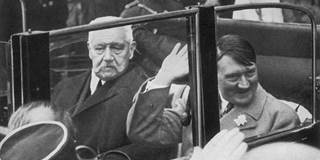The collapse of the Weimar Republic and the emergence of the Nazis' Third Reich in the early 1930s still stands as one of modern history's most powerful cautionary tales. Its lessons are as relevant today as ever – and not just for countries with fragile political systems.
PRINCETON – Since the establishment of the Federal Republic of Germany in 1949, Germans have looked back anxiously to the collapse of the Weimar Republic in the early 1930s and the rise of Nazism. But with many of the world’s democracies under growing strain and authoritarianism on the rise, the lessons of that period should be heeded elsewhere as well.
Start with the fact that economic shocks – for example, inflationary spirals, depressions, and banking crises – are challenges to all governments, everywhere and always. Economic insecurity and hardship persuade people that any regime must be better than the current one. This is an obvious lesson not just from the Weimar years, but also from a large body of research on the economic logic of democracy.
A second key lesson is that under extreme economic conditions, proportional representation (PR) can make matters worse. When a country’s politics are fragmented, PR is more likely to deliver an incoherent electoral majority, usually comprising parties on the far left and the far right that want to reject “the system,” but agree on little else.

PRINCETON – Since the establishment of the Federal Republic of Germany in 1949, Germans have looked back anxiously to the collapse of the Weimar Republic in the early 1930s and the rise of Nazism. But with many of the world’s democracies under growing strain and authoritarianism on the rise, the lessons of that period should be heeded elsewhere as well.
Start with the fact that economic shocks – for example, inflationary spirals, depressions, and banking crises – are challenges to all governments, everywhere and always. Economic insecurity and hardship persuade people that any regime must be better than the current one. This is an obvious lesson not just from the Weimar years, but also from a large body of research on the economic logic of democracy.
A second key lesson is that under extreme economic conditions, proportional representation (PR) can make matters worse. When a country’s politics are fragmented, PR is more likely to deliver an incoherent electoral majority, usually comprising parties on the far left and the far right that want to reject “the system,” but agree on little else.